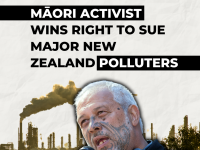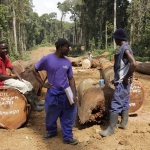Māori Activist Wins Right to Sue Major New Zealand Polluters

© Dan McGrath / Greenpeace
Climate activist Mike Smith, a Māori elder in Aotearoa (New Zealand), sued seven of the biggest greenhouse gas emitters in the country to publicly admit that they caused a public nuisance and dramatically scale back emissions to reach net zero by 2050. In February 2024, New Zealand’s Supreme Court ruled that his lawsuit should be examined under Indigenous customary laws.
“Mike Smith’s case has confirmed polluters like Fonterra could be held legally responsible for the climate devastation they’ve caused. These big polluters have taken that right away from New Zealanders across the country, and now, the Supreme Court has put them on notice for their climate crimes.” – Russel Norman, executive director of Greenpeace Aotearoa
Biggest Polluters
Recently New Zealand’s Environmental Protection Agency began publishing polluter data by company name as required under the Climate Response Act, revealing that a small number of companies, notably in the fossil fuel and the agribusiness sector, were responsible for almost half of the country’s annual greenhouse gas emissions of 80 million tonnes.
Lawsuit
Mike Smith, who is an elder of the Ngāpuhi and Ngāti Kahu iwi (nation), is the climate change spokesman for the Iwi Chairs Forum (a national tribal leaders’ forum). In 2019, he sued five fossil fuel companies (BT Mining, Channel Infrastructure, Genesis Energy, NZ Steel and Z Energy) and two agribusiness companies (Dairy Holdings and Fonterra) over the impact of their polluting activities on his community.
Māori Customs
Smith stated that the courts should take tikanga (Māori customary practices) into account since they have been increasingly accepted as the “first law of New Zealand” by the New Zealand Supreme Court including in environmental protection. He argued that tikanga recognized him as a kaitiaki (carer) acting on behalf of whenua (land), wai (freshwater) and moana (sea).
“Māori are particularly vulnerable to climate change, being disproportionately represented amongst the poor, who will be the hardest hit. Rising sea levels, coastal erosion, flooding and storm surges will irrevocably damage low lying coastal communities,traditional resources, including fisheries.” – Mike Smith, Ngāpuhi and Ngāti Kahu Māori elder.
Rejection
The lawsuit mirrored the actions of many other climate activists around the world who have filed over 2,000 such lawsuits against companies and governments. Smith’s case was initially rejected by a New Zealand court which stated that climate change issues are best left to government regulation rather than the courts. Smith appealed this ruling to the New Zealand Supreme Court.
Victory
The seven companies argued that they did not do business with Smith or his community and thus did not owe him a “duty of care.” On February 7, 2024, the Supreme Court handed the Māori a critical victory for Indigenous rights agreeing that Smith should be considered a “kaitiaki acting on behalf of the whenua, wai and moana” and ordered lower courts to examine this matter further.
Companies’ Responses
“Mr Smith has not yet been required to present any evidence to support his claims. The decision by the Supreme Court does not determine any liability of Fonterra or the other defendants.” – Mike Cronin, Fonterra co-operative affairs managing director.
Genesis Energy added that the seven companies listed in the lawsuit have complied with all national laws on climate change.
📸 © Dan McGrath / Greenpeace
This is #79 in our series of Instagram infographics on resistance against corporate power.
Click here to see the full post on Instagram.



